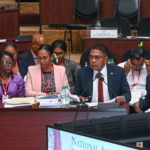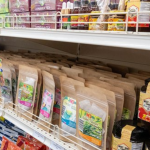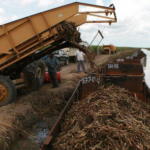With only seven years remaining until 2030, the government has recognised the urgency to address agriculture transformation to develop the local food system to promote sustainable growth and eliminate hunger.
This fact is evident with the increase in budgetary allocation to the agriculture sector from $13.3 billion in 2019 to $33.2 in 2023, a staggering 150 per cent increase.
This was underscored by Minister of Agriculture, Zulfikar Mustapha Wednesday morning, when he addressed the United Nations (UN) Food Systems Summit +2 Stocktaking Moment in Rome, Italy.
The session acts as the first major global follow-up to the 2021 Food Systems Summit, where participants committed to accelerating the transformative power of food systems for the full implementation of all 17 Sustainable Development Goals (SDGs).
Minister Mustapha said the summit has revealed a renewed sense of urgency for financing the national food system transformation.
He stated that CARICOM’s vision 25 by 2025 is a strong political commitment and action plan, which aims to lower the region’s high food import bill by 25 per cent by the year 2025.
“As ministers of agriculture, we are the frontline responders to the farmers through effective policies and required solutions. Our efforts in Guyana are rooted in the obligation to leave no one behind while achieving the SDGs… I encourage all to work together to identify transformative policies and actions to advance that agenda with a focus on leaving no one behind,” the agriculture minister said.
He noted that the catastrophic situation in the region has been evaluated by regional authorities, and actions are being taken to hasten the realisation of the vision. To date, numerous programmes and policies have been implemented to improve food security.
“Guyana is open to assisting our fellow sister countries in whatever way we can. We have commenced bilateral agreements in agriculture with Barbados, Trinidad and Tobago, and St. Vincent and the Grenadines. We continue to hold conversations with many others,” the minister underscored.
The national pathway created by nations has shown the country’s capacity to fulfill its obligation to find the gaps and solutions necessary to achieve coherence in the implementation of the 2030 Agenda.
In this regard, the government is investing in enhanced infrastructure, expansion and diversification of the livestock sector, cultivation of new crops, utilising climate-smart agriculture practices, production of brackish water shrimp, cage fish farming, and prawn production among others.
The transformation of Guyana’s food system is being considerably aided by the efforts and policies now in place.
To address the urgent concerns of capital, capacity, and developmental prospects, Minister Mustapha noted that Guyana’s relationship with the UN agencies continues to be essential.
“We must rely on your support to bridge these gaps and achieve our goals… We know those who are left the furthest behind are often the ones with the weakest capacities to engage and partner effectively. As such, we must help provide that enabling space. It all starts with a conversation, and willingness for partnerships is a prerequisite to this.”
The summit’s side event is centred on ‘Using National Pathways as a platform for the enhancement of public policies with close support from the UN system – cases of Guatemala, Peru, and Guyana.’







